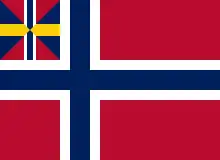| Archduke Karl Ludwig of Austria | |||||
|---|---|---|---|---|---|
 Photograph by Ludwig Angerer, about 1861 | |||||
| Born | 30 July 1833 Schönbrunn Palace, Vienna, Austrian Empire | ||||
| Died | 19 May 1896 (aged 62) Vienna, Austria-Hungary | ||||
| Burial | Imperial Crypt, Vienna | ||||
| Spouse | |||||
| Issue | |||||
| |||||
| House | Habsburg-Lorraine | ||||
| Father | Archduke Franz Karl of Austria | ||||
| Mother | Princess Sophie of Bavaria | ||||
Archduke Karl Ludwig Josef Maria of Austria (30 July 1833 – 19 May 1896) was the younger brother of both Franz Joseph I of Austria and Maximilian I of Mexico, and the father of Archduke Franz Ferdinand of Austria (1863–1914), whose assassination ignited World War I.[1] His grandson was the last emperor of Austria, Charles I.
Biography

He was born at Schönbrunn Palace in Vienna, the son of Archduke Franz Karl of Austria (1802–1878) and his wife Princess Sophie of Bavaria (1805–1872).
His mother ensured he was raised a devout Roman Catholic by the Vienna Prince-archbishop Joseph Othmar Rauscher, a conviction that evolved into religious mania in his later years.
Though not interested in politics, the 20-year-old joined the Galician government of Count Agenor Romuald Gołuchowski and in 1855 accepted his appointment as Tyrolean stadtholder in Innsbruck, where he took his residence at Ambras Castle. However, he found his authority to exert power restricted by the Austrian cabinet of his cousin Archduke Rainer Ferdinand and Baron Alexander von Bach. He finally laid down the office upon the issue of the 1861 February Patent for a life as patron of the arts and sciences.
As the eldest surviving brother of the Emperor, Karl Ludwig, after the death of his nephew Crown Prince Rudolf of Austria in 1889, became heir presumptive to the Austro-Hungarian Empire. A newspaper article appeared shortly after the death of his nephew claiming that the Archduke had renounced his succession rights in favor of his eldest son Franz Ferdinand.[2] This rumor proved to be false.[3]
Marriage and family
| Monarchical styles of Archduke Karl Ludwig of Austria | |
|---|---|
.png.webp) | |
| Reference style | His Imperial and Royal Highness |
| Spoken style | Your Imperial and Royal Highness |



Karl Ludwig married three times.
His first wife, whom he married on 4 November 1856 at Dresden, was his first cousin Margaretha of Saxony (1840–1858), the daughter of Johann of Saxony (1801–1873) and Amalie Auguste of Bavaria (1801–1877). She died on 15 September 1858 and they had no children.
His second wife, whom he married by proxy on 16 October 1862 at Rome, and in person on 21 October 1862 at Venice, was Princess Maria Annunciata of Bourbon-Two Sicilies (1843–1871), daughter of Ferdinand II of the Two Sicilies (1810–1859) and Maria Theresa of Austria (1816–1867).
They had four children:
- Archduke Franz Ferdinand of Austria (December 18, 1863 – June 28, 1914), whose assassination was a cause for the First World War. He married morganatically Countess Sophie Chotek von Chotkow und Wognin on 1 July 1900. They had three children.
- Archduke Otto Franz of Austria (21 April 1865 – 1 November 1906) he married Princess Maria Josepha of Saxony (1867–1944) on 2 October 1886. They had two sons, including Karl I, the last Emperor of Austria.
- Archduke Ferdinand Karl of Austria (27 December 1868 – 12 March 1915) he married morganatically Bertha Czuber on 15 August 1909.
- Archduchess Margarete Sophie of Austria (13 May 1870 – 24 August 1902) she married Albrecht, Duke of Württemberg on 24 January 1893. They had seven children.
Maria Annunciata died on 4 May 1871.
His third wife, whom he married on 23 July 1873 at Kleinheubach, was Infanta Maria Theresa of Portugal (1855–1944), daughter of Miguel I of Portugal (1802–1866) and Adelaide of Löwenstein-Wertheim-Rosenberg (1831–1909).
They had two daughters:
- Archduchess Maria Annunziata of Austria (31 July 1876 – 8 April 1961). Abbess of the Theresia Convent in the Hradschin, Prague.
- Archduchess Elisabeth Amalie of Austria (7 July 1878 – 13 March 1960) she married Prince Aloys of Liechtenstein on 20 April 1903. They had eight children.
Death
Karl Ludwig died of typhoid at Schönbrunn in Vienna after returning from a journey to Palestine and Egypt, allegedly after the consumption of contaminated Jordan waters.
His widow Maria Teresa died on 12 February 1944.
Honours and awards
- Austrian orders and decorations[4]
- Knight of the Golden Fleece, 1852[5]
- Grand Cross of St. Stephen, 1859[6]
- Military Merit Medal on red ribbon
- Long Service Cross for Officers, 2nd Class
- Foreign orders and decorations[4]
.svg.png.webp) Baden: Knight of the House Order of Fidelity, 1873[7]
Baden: Knight of the House Order of Fidelity, 1873[7].svg.png.webp) Kingdom of Bavaria: Knight of St. Hubert, 1853[8]
Kingdom of Bavaria: Knight of St. Hubert, 1853[8].svg.png.webp) Belgium: Grand Cordon of the Order of Leopold, 20 May 1853 – wedding gift[9]
Belgium: Grand Cordon of the Order of Leopold, 20 May 1853 – wedding gift[9].svg.png.webp) Empire of Brazil: Grand Cross of the Southern Cross
Empire of Brazil: Grand Cross of the Southern Cross Duchy of Brunswick: Grand Cross of Henry the Lion
Duchy of Brunswick: Grand Cross of Henry the Lion Denmark: Knight of the Elephant, 21 July 1890[10]
Denmark: Knight of the Elephant, 21 July 1890[10].svg.png.webp)
.svg.png.webp)
.svg.png.webp) Ernestine duchies: Grand Cross of the Saxe-Ernestine House Order, May 1857[11]
Ernestine duchies: Grand Cross of the Saxe-Ernestine House Order, May 1857[11].svg.png.webp) French Empire: Grand Cross of the Legion of Honour
French Empire: Grand Cross of the Legion of Honour.svg.png.webp) Kingdom of Greece: Grand Cross of the Redeemer
Kingdom of Greece: Grand Cross of the Redeemer Grand Duchy of Hesse: Grand Cross of the Ludwig Order, 13 August 1851[12]
Grand Duchy of Hesse: Grand Cross of the Ludwig Order, 13 August 1851[12]_crowned.svg.png.webp) Kingdom of Italy: Knight of the Annunciation, 21 September 1873[13]
Kingdom of Italy: Knight of the Annunciation, 21 September 1873[13]
.svg.png.webp) Holy See: Grand Cross of the Order of Pope Pius IX
Holy See: Grand Cross of the Order of Pope Pius IX.svg.png.webp) Sovereign Military Order of Malta: Grand Cross of Honour and Devotion
Sovereign Military Order of Malta: Grand Cross of Honour and Devotion.svg.png.webp) Mexican Empire: Grand Cross of the Mexican Eagle
Mexican Empire: Grand Cross of the Mexican Eagle.svg.png.webp) Nassau Ducal Family: Knight of the Gold Lion of Nassau
Nassau Ducal Family: Knight of the Gold Lion of Nassau Netherlands: Grand Cross of the Netherlands Lion
Netherlands: Grand Cross of the Netherlands Lion.svg.png.webp) Ottoman Empire: Order of Osmanieh, 1st Class in Diamonds
Ottoman Empire: Order of Osmanieh, 1st Class in Diamonds Persian Empire: Order of the August Portrait, in Diamonds
Persian Empire: Order of the August Portrait, in Diamonds.svg.png.webp) Kingdom of Portugal: Grand Cross of the Tower and Sword
Kingdom of Portugal: Grand Cross of the Tower and Sword.svg.png.webp) Kingdom of Prussia:
Kingdom of Prussia:
- Knight of the Black Eagle, 4 June 1853; with Collar, 1861[14]
- Knight of the Red Eagle, 1st Class
- Grand Commander's Cross of the Royal House Order of Hohenzollern, 2 April 1877[14]
 Kingdom of Romania: Grand Cross of the Star of Romania
Kingdom of Romania: Grand Cross of the Star of Romania Russian Empire:
Russian Empire:
.svg.png.webp) Saxe-Weimar-Eisenach: Grand Cross of the White Falcon, 1885[15]
Saxe-Weimar-Eisenach: Grand Cross of the White Falcon, 1885[15].svg.png.webp) Kingdom of Saxony: Knight of the Rue Crown
Kingdom of Saxony: Knight of the Rue Crown.svg.png.webp) Principality of Serbia: Grand Cross of the Cross of Takovo
Principality of Serbia: Grand Cross of the Cross of Takovo.svg.png.webp) Siam: Grand Cross of the Crown of Siam, in Diamonds
Siam: Grand Cross of the Crown of Siam, in Diamonds.svg.png.webp) Spain: Grand Cross of the Order of Charles III, with Collar, 15 April 1888[16]
Spain: Grand Cross of the Order of Charles III, with Collar, 15 April 1888[16].svg.png.webp)
 Sweden-Norway: Knight of the Seraphim, 7 January 1870[17]
Sweden-Norway: Knight of the Seraphim, 7 January 1870[17] Württemberg: Grand Cross of the Württemberg Crown, 1867[18]
Württemberg: Grand Cross of the Württemberg Crown, 1867[18]
Ancestry
| Ancestors of Archduke Karl Ludwig of Austria |
|---|
See also
References
- ↑ "Franz Ferdinand, Archduke of Austria." Encyclopedia of World Biography. Vol. 29. Detroit: Gale, 2009. Gale Biography In Context. Web. 18 May 2012.
- ↑ "The Crown Prince's Successor". The New York Times. 1889-02-02.
- ↑ "Austria's Insecurity" (PDF). The New York Times. 1896-06-16.
- 1 2 Hof- und Staats-Handbuch der Österreichisch-Ungarischen Monarchie (1896), Genealogy p. 2
- ↑ Boettger, T. F. "Chevaliers de la Toisón d'Or - Knights of the Golden Fleece". La Confrérie Amicale. Retrieved 25 June 2019.
- ↑ "A Szent István Rend tagjai" Archived 22 December 2010 at the Wayback Machine
- ↑ Hof- und Staats-Handbuch des Großherzogtum Baden (1876), "Großherzogliche Orden", p. 59
- ↑ Hof- und Staats-Handbuch des Königreichs Bayern (1873), "Königliche-Orden" p. 9
- ↑ H. Tarlier (1854). Almanach royal officiel, publié, exécution d'un arrête du roi (in French). Vol. 1. p. 37.
- ↑ Jørgen Pedersen (2009). Riddere af Elefantordenen, 1559–2009 (in Danish). Syddansk Universitetsforlag. p. 472. ISBN 978-87-7674-434-2.
- ↑ Staatshandbücher für das Herzogtums Sachsen-Altenburg (1869), "Herzogliche Sachsen-Ernestinischer Hausorden" p. 21
- ↑ Hof- und Staats-Handbuch des Großherzogtum Hessen (1883), "Großherzogliche Orden und Ehrenzeichen", p. 12
- ↑ Italia : Ministero dell'interno (1884). Calendario generale del Regno d'Italia. Unione tipografico-editrice. p. 47.
- 1 2 "Königlich Preussische Ordensliste", Preussische Ordens-Liste (in German), Berlin, 1: 5, 935, 1886 – via hathitrust.org
- ↑ Staatshandbuch für das Großherzogtum Sachsen / Sachsen-Weimar-Eisenach (1891), "Großherzogliche Hausorden" p. 16
- ↑ "Real y distinguida orden de Carlos III", Guóa Oficial de España (in Spanish), 1895, p. 167, retrieved 4 July 2021
- ↑ Sveriges statskalender (in Swedish), 1877, p. 368, retrieved 2018-01-06 – via runeberg.org
- ↑ Hof- und Staats-Handbuch des Königreich Württemberg (1894), "Königliche Orden" p. 27
- 1 2 Wurzbach, Constantin von, ed. (1860). . Biographisches Lexikon des Kaiserthums Oesterreich [Biographical Encyclopedia of the Austrian Empire] (in German). Vol. 6. p. 208 – via Wikisource.
- 1 2 Wurzbach, Constantin von, ed. (1860). . Biographisches Lexikon des Kaiserthums Oesterreich [Biographical Encyclopedia of the Austrian Empire] (in German). Vol. 6. p. 257 – via Wikisource.
- 1 2 Wurzbach, Constantin von, ed. (1861). . Biographisches Lexikon des Kaiserthums Oesterreich [Biographical Encyclopedia of the Austrian Empire] (in German). Vol. 7. p. 81 – via Wikisource.
- 1 2 Genealogie ascendante jusqu'au quatrieme degre inclusivement de tous les Rois et Princes de maisons souveraines de l'Europe actuellement vivans [Genealogy up to the fourth degree inclusive of all the Kings and Princes of sovereign houses of Europe currently living] (in French). Bourdeaux: Frederic Guillaume Birnstiel. 1768. p. 94.
- 1 2 Wurzbach, Constantin von, ed. (1861). . Biographisches Lexikon des Kaiserthums Oesterreich [Biographical Encyclopedia of the Austrian Empire] (in German). Vol. 7. p. 149 – via Wikisource.
- 1 2 "Karoline Friederike Wilhelmine Königin von Bayern". Haus der Bayerischen Geschichte [House of Bavarian History] (in German). Bavarian Ministry of State for Wissenschaft and Kunst. Archived from the original on 1 December 2018. Retrieved 30 November 2018.
External links
 Media related to Archduke Karl Ludwig of Austria at Wikimedia Commons
Media related to Archduke Karl Ludwig of Austria at Wikimedia Commons